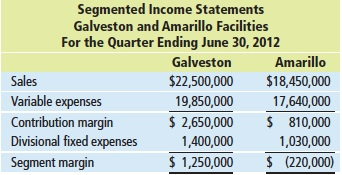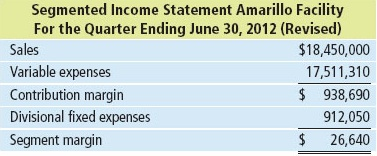Question
34. Comprehensive Responsibility Accounting, Segment Margin, and Management Compensation LO2, 4, 8 Gantry Manufacturing is a medium-sized organization with manufacturing facilities in seven locations around
34. Comprehensive Responsibility Accounting, Segment Margin, and Management Compensation
LO2, 4, 8
Gantry Manufacturing is a medium-sized organization with manufacturing facilities in seven locations around the southwestern United States. Of these facilities, Galveston and Amarillo are treated as profit centers, with local management exercising authority over manufacturing costs, certain nonmanufacturing costs (e.g., advertising at local minor league baseball stadiums, sponsoring local charity events), and sales revenue. The segment income statements that follow were prepared by facility-level accountants and were provided to the corporate office in Denver, Colorado, shortly after the end of this year's second quarter. Note that the statements are shown in parallel for convenience and are not intended to be combined for analysis purposes.

The managers of these two facilities are former classmates at the University of Texas at Austin and routinely stay in touch with each other. Shortly after receiving the quarterly results from his accountant, the Amarillo manager, Jim Lowell, called his friend in Galveston to talk about the surprising loss shown on his facility's income statement. After a short conversation with the Galveston manager, Jim met with his accountant. He learned the following:
- A recent memo sent from the corporate controller to all facility controllers indicated that new manufacturing overhead rates should be used beginning May 1, 2012. The old rate was $2.80 per direct labor hour and the new rate is $3.25 per direct labor hour. The memo had a new policy statement attached to it asserting that individual manufacturing facilities could no longer establish individual overhead rates.
- An average of 210 employees worked 40 hours per week during the quarter. There were 13 weeks in the second quarter.
- Each division was required to record a onetime expense associated with ethics training for all new and current employees. The Amarillo facility received an expense allocation of $58,000. Sixty-five percent of the allocation is related to manufacturing employees, and the remainder is related to administrative employees.
- The corporate office also implemented a new policy related to certain divisional employees' retirement, insurance, and other benefits. In past years, all benefits were paid by the corporate office and were not allocated to local facilities. However, the company's new president believes that those costs are more properly reflected in the expenses of the individual facilities because they are incurred by local employees. In total, additional retirement and insurance expenses of $46,500 were incurred for each month during the quarter ended June 30, 2012. Thirty percent of the monthly expenses are related to manufacturing employees, and the remainder is related to administrative employees.
- Jim was immediately frustrated by all that he learned from the accountant. Because his and other managers' bonuses depend on quarterly financial performance, he feels that the corporate memos unfairly reduce his division's profits. He asked his controller to prepare a revised income statement without the changes implemented by the corporate office during the quarter. Amarillo's revised income statement appeared as follows:

Jim is not particularly pleased with the financial performance of his facility, preferring to report a small profit as opposed to a more significant loss. He now must decide how to communicate with the corporate office about this revised income statement. You should bear in mind that the corporate office only provides administrative services and does not manufacture goods; however, sales activities for five of the company's facilities are handled in the corporate office.
Required
A. Assist Jim by identifying reasons that support his desire that the Amarillo facility not be required to implement the changes made by the corporate office.
B. What are the implications of having the corporate office issue memos requiring the facilities to record certain expenses, given the company's bonus structure? How will the corporate office's new policy affect the facility management's motivation?
C. What are some of the possible bases that Gantry Manufacturing could use to allocate fixed expenses?
Comprehensive Responsibility Accounting, Segment Margin, and Management Compensation Gantry Manufacturing is a medium-sized organization with manufacturing facilities in seven locations around the southwestern United States. Of these facilities, Galveston and Amarillo are treated as profit centers, with local management exercising authority over manufacturing costs, certain nonmanufacturing costs (e.g., advertising at local minor league baseball stadiums, sponsoring local charity events), and sales revenue. The segment income statements that follow were prepared by facility-level accountants and were provided to the corporate office in Denver, Colorado, shortly after the end of this year's second quarter. Note that the statements are shown in parallel for convenience and are not intended to be combined for analysis purposes. The managers of these two facilities are former classmates at the University of Texas at Austin and routinely stay in touch with each other. Shortly after receiving the quarterly results from his accountant, the Amarillo manager, Jim Lowell, called his friend in Galveston to talk about the surprising loss shown on his facility's income statement. After a short conversation with the Galveston manager, Jim met with his accountant. He learned the following: - A recent memo sent from the corporate controller to all facility controllers indicated that new manufacturing overhead rates should be used beginning May 1, 2012. The old rate was $2.80 per direct labor hour and the new rate is $3.25 per direct labor hour. The memo had a new policy statement attached to it asserting that individual manufacturing facilities could no longer establish individual overhead rates. An average of 210 employees worked 40 hours per week during the quarter. There were 13 weeks in the second quarter. Each division was required to record a onetime expense associated with ethics training for all new and current employees. The Amarillo facility received an expense allocation of $58,000. Sixty-five percent of the allocation is related to manufacturing employees, and the remainder is related to administrative employees. The corporate office also implemented a new policy related to certain divisional employees' retirement, insurance, and other benefits. In past years, all benefits were paid by the corporate office and were not allocated to local facilities. However, the company's new president believes that those costs are more properly reflected in the expenses of the individual facilities because they are incurred by local employees. In total, additional retirement and insurance expenses of $46,500 were incurred for each month during the quarter ended June 30, 2012. Thirty percent of the monthly expenses are related to manufacturing employees, and the remainder is related to administrative employees. Jim was immediately frustrated by all that he learned from the accountant. Because his and other managers' bonuses depend on quarterly financial performance, he feels that the corporate memos unfairly reduce his division's profits. He asked his controller to prepare a revised income statement without the changes implemented by the corporate office during the quarter. Amarillo's revised income statement appeared as follows: Jim is not particularly pleased with the financial performance of his facility, preferring to report a small profit as opposed to a more significant loss. He now must decide how to communicate with the corporate office about this revised income statement. You should bear in mind that the corporate office only provides administrative services and does not manufacture goods; however, sales activities for five of the company's facilities are handled in the corporate office. A. Assist Jim by identifying reasons that support his desire that the Amarillo facility not be required to implement the changes made by the corporate office. What are the implications of having the corporate office issue memos requiring the facilities to record certain expenses, given the company's bonus structure? How will the corporate office's new policy affect the facility management's motivation? What are some of the possible bases that Gantry Manufacturing could use to allocate fixed expensesStep by Step Solution
There are 3 Steps involved in it
Step: 1

Get Instant Access to Expert-Tailored Solutions
See step-by-step solutions with expert insights and AI powered tools for academic success
Step: 2

Step: 3

Ace Your Homework with AI
Get the answers you need in no time with our AI-driven, step-by-step assistance
Get Started


